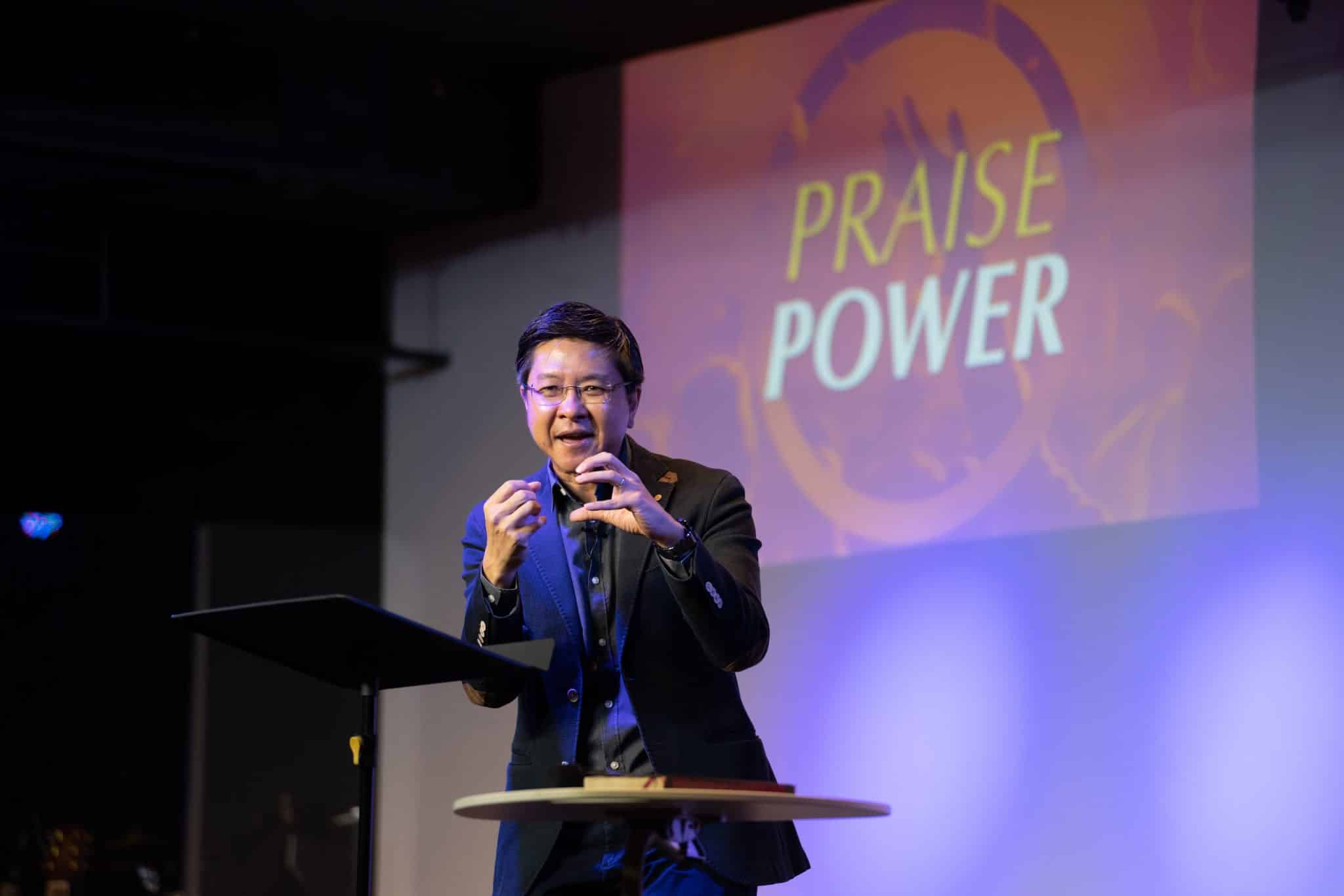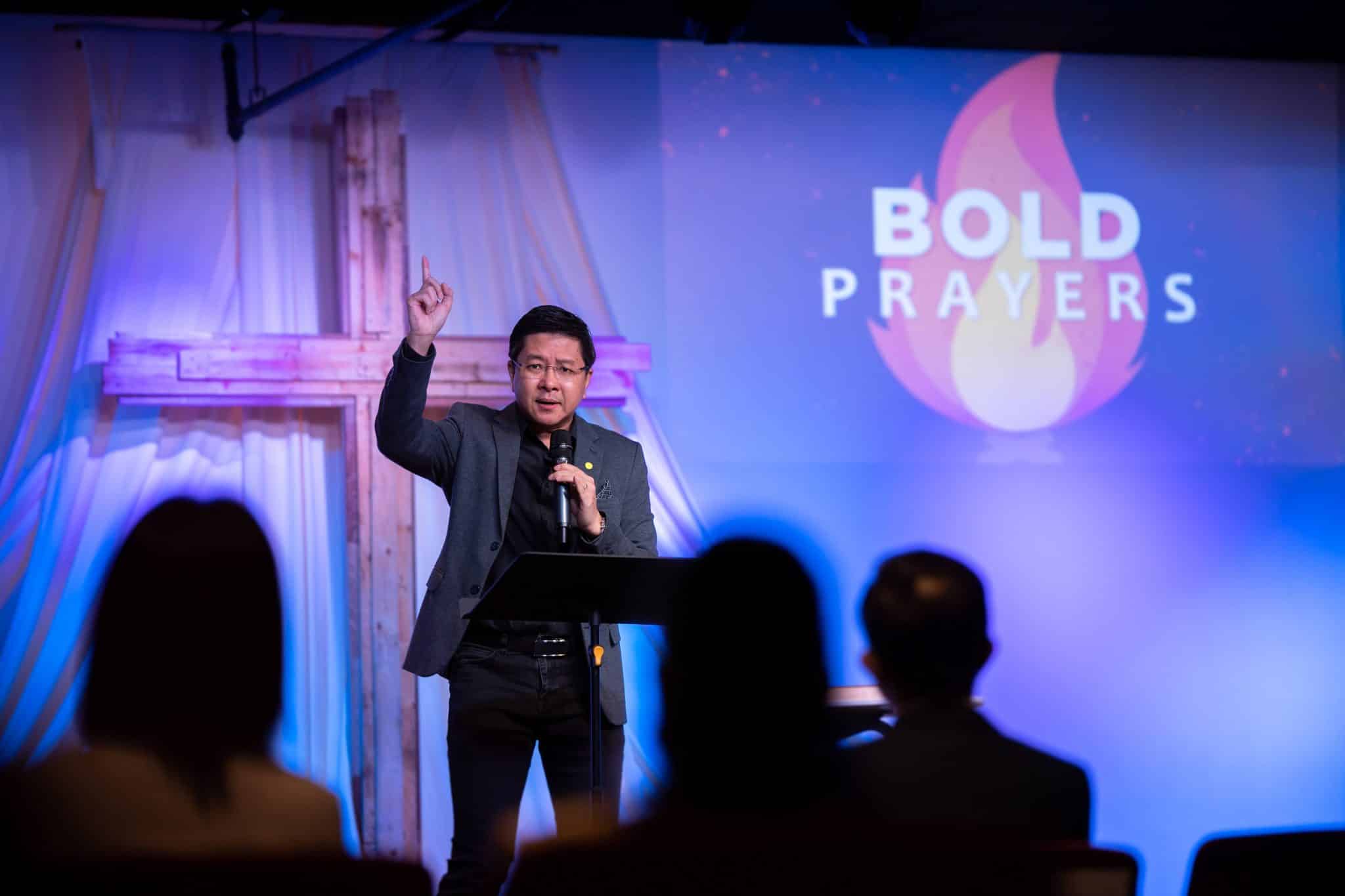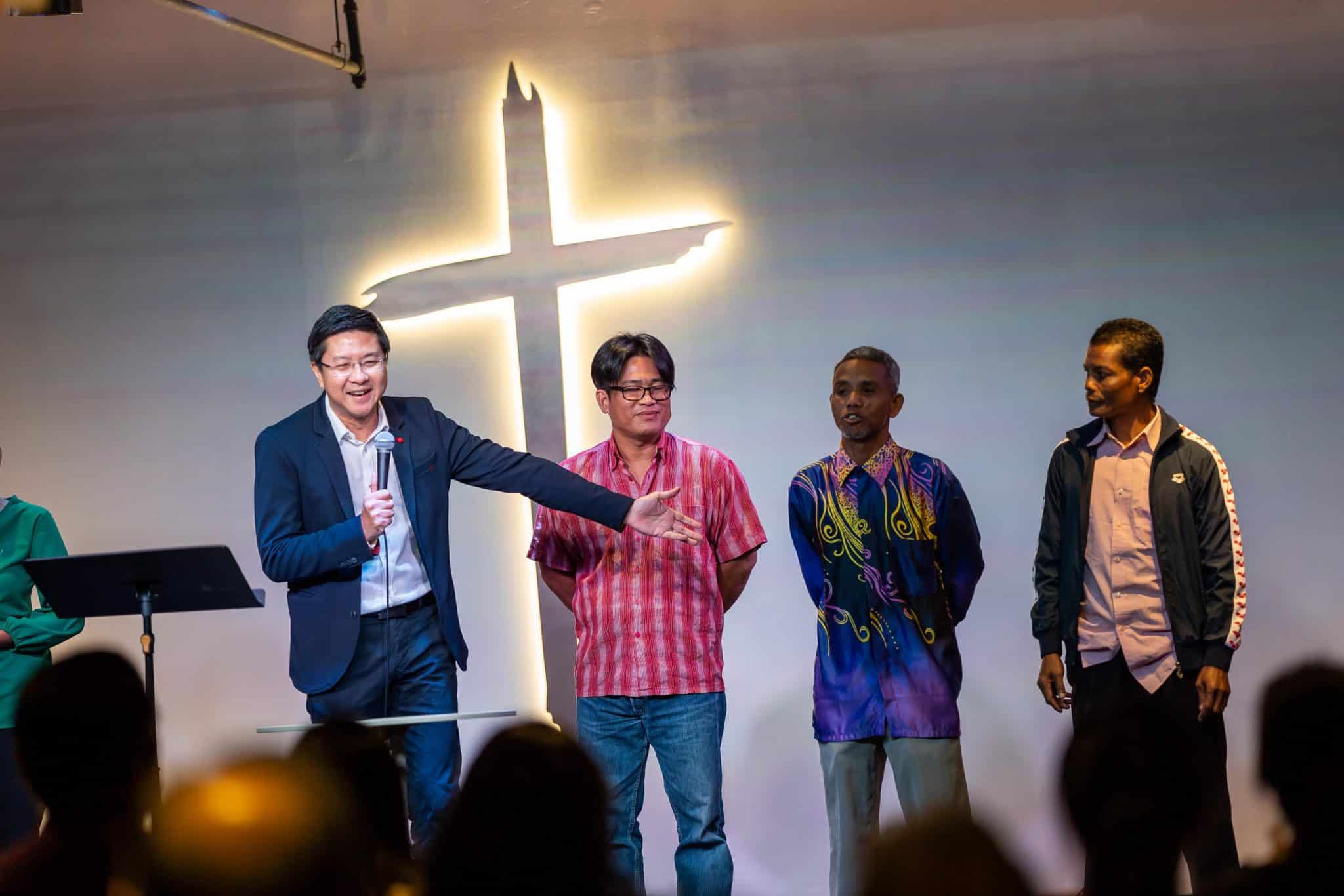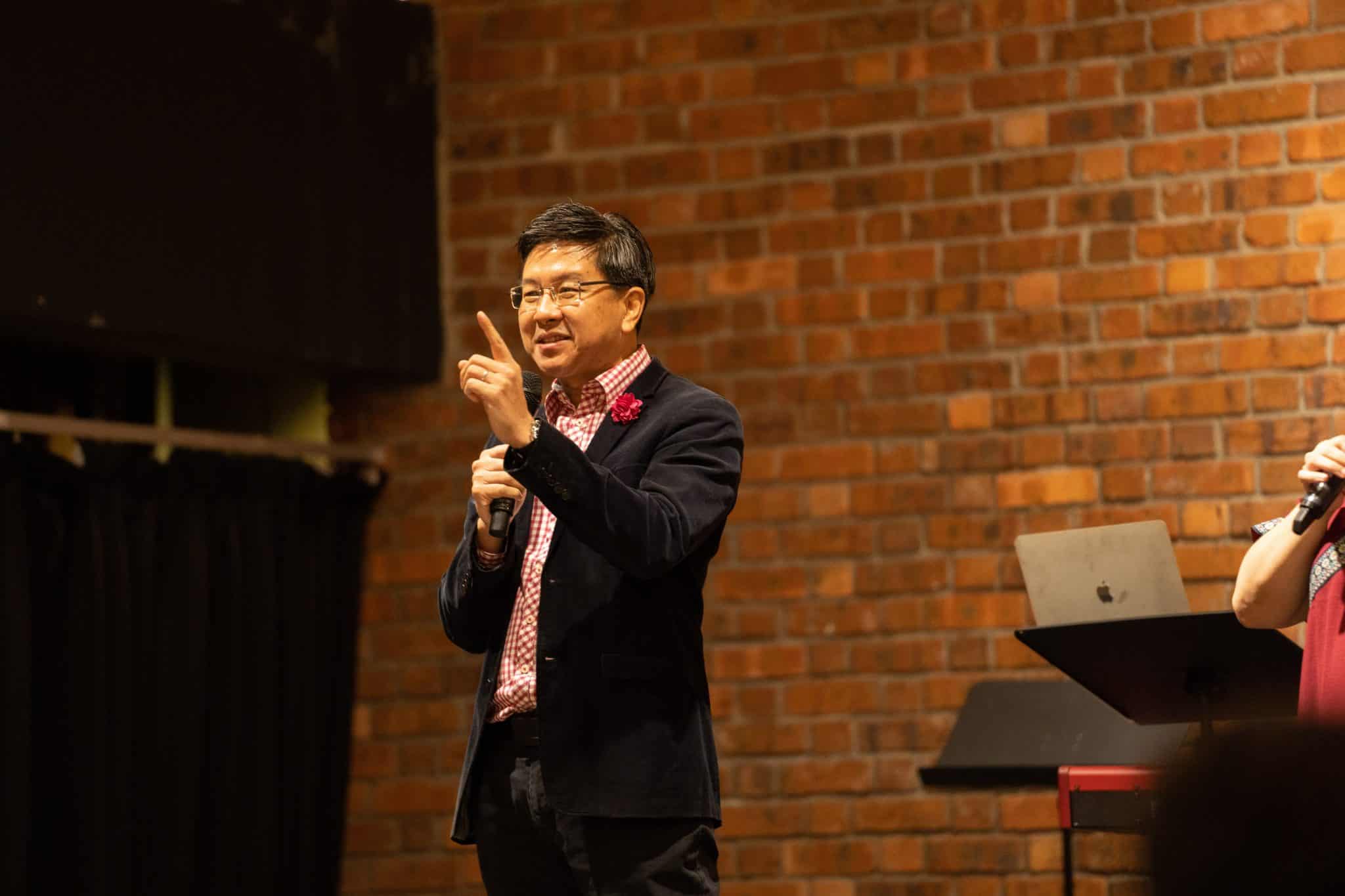“Do you have mentors that counsel, challenge and admonish you?”: Leadership coach Rev Eric Lau on dynamic stewardship
Michelle Chun // January 12, 2023, 7:24 pm

Underlying Rev Eric Lau's passion for people and zeal for God, Eric knows that special grace has been placed upon him for the very unique call of God in his life. All photos courtesy of Rev Eric Lau.
“Of all the types of leadership out there, church leadership is the hardest,” Rev Eric Lau said matter-of-factly.
A trainer and consultant to senior executives including CEOs of Fortune 500 companies, Eric is also an ordained minister with the Assemblies of God in Malaysia.
He accepted Jesus Christ at nine years old at Bethany Church KL and 41 years later is now the senior pastor and the only bi-vocational member on staff at Bethany. He is also a guest trainer for leadership consultancies and an adjunct lecturer with the Bible College of Malaysia.
But underlying his passion for people and zeal for God, the 50-year-old knows that, only by grace, is he able to answer the unique call of God in his life.
Called to full-time and the marketplace
Growing up in church, Eric has served in almost every capacity he can serve throughout his four decades at Bethany.
“You name it, I’ve probably done it,” he said with a laugh. By his mid-twenties, he was on the church board and soon after, the leadership approached him to take on a pastoral role.

Rev Eric Lau preaching at Bethany Church KL. The senior pastor and leadership trainer stepped into his bi-vocational calling in 2001.
At the same time, his career was taking off.
Having graduated in marketing, he worked for multinationals including Pepsi and Unilever, building brands and creative campaigns. He enjoyed his work and felt a sense of fulfilment in the workplace.
“I had never felt called to full-time ministry in a traditional sense. So when my then senior pastor, Rev Joyce Williams, asked me to enter the ministry, I said no,” he shared.
However, new possibilities opened up when their church advisor, Rev Dominic Yeo of Trinity Christian Centre, Singapore, suggested the bi-vocational approach.
After prayer, he became an Assistant Pastor in 2001.
Where passion and talent meet
It was around 2006 while he was still at Unilever that Eric felt God leading him away from marketing and into a new field, something he says he is more wired for: Training and consulting.
He knew he was passionate about people and helping them rise up to their full potential.
“Marketing was my passion then, but God wanted me to do something different. John Maxwell once said that ‘where talent meets passion, there is fulfilment and excellence’. And God sent so many people to speak into my life and crystallise everything,” he recounted.
He knew he was passionate about people and helping them rise up to their full potential.
His work and service in church had also shown him that he had a talent for communicating effectively and articulating his thoughts well. Becoming a trainer seemed the natural course of progression.
But Eric knew that it was a complete shift in career path, and with a young family to support he didn’t want to make the wrong decision. But his wife and others encouraged him to pursue what he believed God was calling him to.
So while still holding down his job, he began taking courses and obtaining certifications in training. It was a process that took nearly two years.

Eric sharing on Missions Sunday alongside three of his Orang Asli (Malaysia’s indigenous peoples) pastors. Bethany has three OA churches in West Malaysia.
Once certified, the family braced to live with less as Eric anticipated he would have to take a pay cut. But God did not fail to provide, and Eric landed a job at Dale Carnegie which matched his previous salary.
It was the start of a journey being in the ‘bullseye’, according to Eric. Training and developing people was the sweet spot where his passion and talents met.
Stewarding two leaderships
After Dale Carnegie, Eric accepted the invitation of his friend and junior from Methodist Boys’ School KL, Roshan Thiran, to help pioneer a start-up, Leaderonomics, a leadership development and consulting company, in Kuala Lumpur.
He stayed as executive director and helmed the learning pillar for over five years before realising he was no longer in his bullseye. “I realised I was training less, leading and managing the business more. And I knew I wanted to train people,” he said.
“For me, the heavier burden I carry is managing the spiritual piece. As a pastor, how do I fulfil what God has called me to do.”
So he exited and started his own boutique leadership training and consultancy, Leadership Edge, in 2014 together with his wife, Esther. Today, Eric advises and trains a select pool of clients – the goal, he said, is not to go wide but to go deep.
While his corporate career was being established, his ministry as a pastor was growing as well. He was overseeing several ministries, on the preaching roster and working closely with Rev Joyce Williams.
It was thus no surprise when he was asked to prayerfully consider taking over as senior pastor when succession talks began. Although he had no theological training at the time, his senior pastor and church board strongly felt he was suited for the position.
“My wife was also instrumental because she pointed out that all the doors were open. My senior pastor and church board wanted it, and the Assemblies of God Malaysia General Superintendent gave his approval even though bi-vocational pastors were (and still are) quite rare,” Eric said.
After some prayer and deliberation, Eric accepted the role. In 2011, while he was still with Leaderonomics, he was appointed Bethany’s senior pastor.
“For me, the heavier burden I carry is managing the spiritual piece. As a pastor, how do I fulfil what God has called me to do,” he said.
The Church is both task- and people-oriented
Having walked with leaders from various organisations through crises, transitions and their personal development journey, Eric firmly believes church leadership is the toughest.
“The Great Commandment is people-oriented but the Great Commission is task-oriented. We have to balance both.”
“In church, we have to get things done and somehow, always be nice. We’re great at spotting potential (the heart) and good character, but where we sometimes fall short is training the head (mindset) and hands (skillset),” he explained.
This results in churches having many enthusiastic and hardworking people who simply cannot get the job done.
“We overlook competence by prioritising sincerity and a good attitude. Is (church) caring for people at the expense of the task? No, it has to be both.”
The seasoned trainer then flips on his pastor’s hat and drives his point through. The Great Commandment (to love God and others) is people-oriented but the Great Commission (Matthew 28:16-20) is task-oriented.

Eric and Esther (to his left) run Leadership Edge together and are blessed with two children.
The church, Eric reiterates, has to balance caring for people and getting things done. “Otherwise, we end up not being good stewards of what God has entrusted to us,” he added.
Values drive a person’s leadership
Leaders, whether in church or not, also need to have a solid Bible-based value system because we lead out of our value system.
“Whether it’s pulpit errors or administrative decisions, they have to hold me accountable.”
Eric explained this concept with an example: If you uphold integrity as a value, you would naturally establish good corporate governance in your organisation.
“In Bethany’s governance structure, I am both senior pastor and chairman of the board. So you could say that I’m very ‘powerful’. But I’m not all-powerful. For one, the board can vote me out anytime,” he stated.
His emphasis on integrity and accountability also means that his board members have free rein to criticise or challenge any of his decisions. “I always tell them, ‘It’s your job to question me. At times we may disagree and I may get upset at you for a while because I’m human too, but that’s your job.’
“Whether it’s pulpit errors or administrative decisions, they have to hold me accountable,” he said plainly.
Thinking out of the box
In church settings, Eric points out that critical thinking and innovation aren’t always at the top of leaders’ minds.
In the corporate world, these are buzzwords but in churches, we can be averse to change.
“We say, ‘God’s Word is unchanging,’ and so we don’t want to change the way we do things. We confuse what can be changed with what cannot,” he said, adding that leaders have to be open to new methods and ways of doing things.

Leaders lead out of their value systems, says Eric, and must guard their heart against pride and the false belief that they are untouchable.
When asked to share some examples, he brings up the idea of full-time theological training as a pre-requisite for pastoral ministry.
“In the corporate world, critical thinking and innovation are buzzwords. But in churches, they aren’t at the top of leaders’ minds.”
Prior to entering full-time ministry, some of his pastors had not completed their formal training. Instead, he recommended that they study part-time while working in church.
“I do require them to have a theological education, but they pursue it while working here. They actually learn more if they work in the church and can apply what they’re learning.
“At the same time, the church pays for their education and they can take office hours to go to classes; the studies then don’t take away their personal time. It works out,” Eric said.
Another example is having a church website. Some pastors, he said incredulously, don’t feel a church website is necessary for today’s day and age. For Eric, it’s about knowing the generations you’re reaching out to and getting at least the basics right.
“I’m of the opinion that an MBA (Master of Business Administration) is a good option for pastors to pursue. It just makes so much sense. You’ll learn strategy, people management, budgeting and many skills that would serve you well in pastoring a church,” he said emphatically.
As a leader, guard your heart
Having walked with leaders from churches both large and small, Eric has also seen how dangerous power can be.
The trainer says the heart of the leader is by far the most important. Leaders need to self-govern well, guarding against pride and loss of values such as integrity.
“Give your mentors free rein to counsel, challenge and admonish you. They can make a huge difference in your journey.”
If you study the lives of Christian leaders who have ‘fallen’, he shared, you’ll notice that many of them started to believe they were untouchable. “They believed they could get away with anything,” he said simply.
Guarding one’s heart is especially important during potential crisis points, such as a transition in leadership. Many older pastors, he said, don’t understand the concept of succession planning and wait until retirement.
“But when it’s time for them to retire, many don’t. Either they feel they’re still wanted, strong and able to contribute, or perhaps their financial situation pushes them to continue working. What happens then is they end up stepping down at, say, 70 years old, but the planned successor is already 50 years old. That’s not much of a runway for the new pastor to take the vision forward before he has to start thinking of retirement, and so the church loses out,” he said.
The loss is great because church leadership functions differently from corporations.
In companies, it’s largely about filling a role because systems are already in place. But in churches, leadership is about continuing the vision. “And so church leadership is much more complex because there is a spiritual dynamic,” Eric concluded.

Eric (seated left) with the board members of Bethany Church KL.
It is therefore essential to be surrounded by mentors and good counsellors. Although a mentor is not easy to find, Eric said one needs to reach out and ask. It must also be an official transaction, not a casual arrangement.
“If you know a leader or senior whose walk with Jesus and leadership style you admire, ask if they would consider being a mentor and coach to you. Give them free rein to counsel, challenge and admonish you,” he advised. A mentor can make a huge difference in your journey as a leader.
If values collide, have open conversations
Today’s churchgoers are very different. Whilst older generations may be used to quiet submission, millennial and Gen Z Christians are fearless in their pursuit of understanding.
Millennial and Gen Z Christians are fearless in their pursuit of understanding.
Eric has journeyed with many young Christians whose chief complaint is that senior leaders simply do not understand what they need. If they ask questions, they are seen as disrespectful.
“The biblical call to submission is clear as long as the values don’t oppose Scripture. If it’s a (morally neutral) case and you’ve exhausted all avenues, the call is to submit or you can choose to step back. Many times though, solutions can be found when both leaders and followers share ideas, learn to dialogue and use the principle of appeal,” he said.
He also challenges older leaders to welcome a generation that asks questions.
“Again, it’s back to critical thinking and innovation. What new methods can we hear out or discuss, then apply to achieve our goals,” he said.
Calling, clarity, and team leadership
As a leadership coach and pastor, Eric believes the Church is God’s sovereign choice to be His representatives on earth.
It’s a high calling, and for leaders, he has three pieces of advice as they seek not just to fly high but also to last long.
- Know your calling. If you know the calling of God upon your life, it will sustain you through the toughest seasons of your journey.
- Have clarity of purpose. Understand clearly why you’re doing what you’re doing, and ensure you have a clear vision and direction.
- Apply team leadership. No leader has a monopoly on knowledge. If you want to lead well, know what you’re good at and find others with the strengths you don’t have to run alongside you. Don’t run solo.
Over two decades ago, several years after Eric first stepped into his bi-vocational calling, he drafted a purpose statement and mission statement for himself. It was not for the church or his company, but for himself.
“Here it is: 15 July 2006. My purpose statement: In all things, to glorify God by doing His will. My mission statement: To impart truth to others, inspire and influence them to rise up to their full potential and calling in God,” he read aloud from his phone’s notes.
For this leader, coach, mentor, pastor, husband and father, his purpose has not changed. In whatever role he plays, his mission remains the same.
“Whatever comes out of me, there should be an impartation of truth because, at the end of the day, it’s the truth that sets us free.”
RELATED STORIES:
“Be open to being challenged. Truth doesn’t mind being questioned”: Alpha pioneer Nicky Gumbel
“If God doesn’t heal, then what?” A question Pastor Philip Lyn grappled with
We are an independent, non-profit organisation that relies on the generosity of our readers, such as yourself, to continue serving the kingdom. Every dollar donated goes directly back into our editorial coverage.
Would you consider partnering with us in our kingdom work by supporting us financially, either as a one-off donation, or a recurring pledge?
Support Salt&Light



